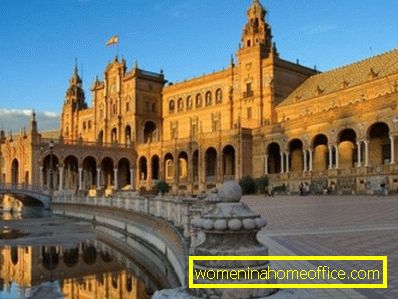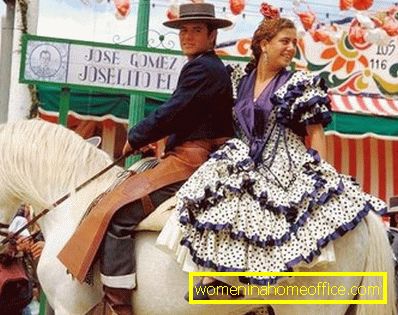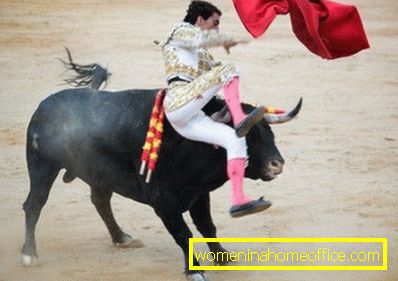Holidays in spain
Where else, if not in Spain, you can ride on a high-speed slide-attraction at a speed of 160 km / h? Where else will you visit the world famous bullfight? Where else can you see magnificent temples, in which all the figures of biblical characters seem to be alive? And finally, where else would you watch the passionate flamenco dance?
When is it better to go to Spain?
The most favorable time to visit Spain is the month from the end of spring to the beginning of autumn. Although the winter here is quite mild, but swimming is no longer possible. The average temperature in the Canary Islands in July is 23-25 degrees. In Madrid, a few degrees cooler in the summer. In winter, in the Canary Islands, the average temperature is between 17-19 degrees, while in Madrid at the same time, the average temperature ranges from 5 to 7 degrees.

Spanish currency
Spain enters the Eurozone, which means that the only official currency of the country is the euro. 1 euro = 100 euro to cents = 43 rubles. In circulation there are banknotes in denominations of 5,10,20,50,100,200 and 500 euros, as well as coins of 1,2,5,10,20 and 50 euros cents and 1,2 euros. Despite the fact that each country in the Eurozone may print slightly different money, money from the EU countries is accepted for payment in Spain.
Currency can be exchanged at bank terminals. Banks are open from 9.00 to 14.00 from Monday to Friday. Work schedule on Saturday - from 9.00 to 12.00. Sunday is a day off. On the main street in Madrid, all banks work seven days a week and around the clock. Be sure to pay attention to what commission banks take when exchanging currencies, sometimes this amount can be quite impressive.
Almost everywhere credit cards are accepted for payment.

Customs in Spain
- Allowed to export and import the national currency in unlimited quantities.
- You can import items for personal use, for example, one video camera or two cameras, sports equipment, a tape recorder, jewelry. However, when entering the territory of Spain, it is best to take a receipt at customs for all those things that you carry. Thanks to this document, it will be much easier to take out the same things on the way back.
- Allowed to import 200 cigarettes, or 50 cigars, or 250 grams of tobacco per person. In addition, it is allowed to transport up to 1 bottle of strong alcoholic beverages and 1 bottle of wine through customs.
Transport in Spain
You can travel around the city either by public transport, taxi or rented car.
- In order to use public transport, you can contact the administrator at the reception desk of the hotel where you stayed. He always has the current schedule of urban transport.
- If you want to take a taxi, you can also contact the hotel administrator or simply stand by the road and raise your hand, the taxi will definitely stop.
- In order to arrange a rental car, some conditions must be met. You must be over 21 years old, and a driver's license must be obtained no later than a year ago. In addition, you will probably require a credit card to write off the amount of the deposit for the car. In case you return the car in the same condition as it was taken, the money will be credited back to your card.
- The cost of renting a car in Spain is around 20 to 120 euros. It depends on which model and class of car you rent. In addition to renting a car, you must independently pay all travel expenses, road fines, fuel, and tire replacement.
- You can also rent a bike or motorcycle. The cost of the first will be about 10-15 euros per day. The cost of renting a motorcycle in Spain will vary from 12 to 60 euros per day, depending on the model.



Communication in Spain and important phones
It will be much cheaper to make calls not from the hotel where you live, but from the street telephone booths. Payments for calls are made using special cards that you can buy directly at the hotel or any tobacco kiosks. The approximate cost of a minute of conversation from such a pay phone to Russia will be 0.75 euros. Calls from the hotel will be much more expensive, so it’s best to keep them to a minimum.
In addition to these methods, there is still the possibility to make calls from special call offices. However, you should specify the cost of the call before it starts. This is due to the fact that the rates for calls vary greatly depending on the company.
Important phones in Spain:
- Police- 092;
- Ambulance - 061;
- Fire Service - 080;
- Any background information, incl. transportation schedule, pharmacy schedule, etc. - 098.
Prices in Spain
Shopping is best done in larger cities of the country. Spain's largest department store chain is El Corte Ingles. Here you can find everything your heart desires. However, prices in these stores are quite high. It is better not to buy in very large stores. The range of products there is not too large, but the prices are much higher than in small shops.
Mode of operation of most stores, from 9.00 am to 20.00 pm. From 13.00 to 16.00 in Spain, siesta, and all stores are closed for a break. On Saturday, the work schedule is significantly shortened - from 9.00 am to 12.00 pm.
Tips are givenmaids and porters at the hotel, taxi drivers, bartenders and waiters in places of public catering. The size of the tip ranges from 5% to 10% of the order amount. Tipping can not leave, but if you were satisfied with the service and did not leave a tip, it is considered a sign of bad taste.

Cuisine in Spain
Initially, Spanish cuisine was rustic. The main ingredients of all dishes were onions, garlic, herbs and sweet bell pepper. But over time, the European trend influenced the Spanish cuisine.
- Currently, the so-called "toop" is popular in Spain. This is a variety of snacks from a variety of ingredients that are served with beer, cider or just before the main meal.
- For the first in Spain, it is accepted to serve cream soup. For example, manna cream soup. The first course is followed by intermediate snacks. Usually they are made from pasta or vegetables. The second is usually served meat or fish dish. In the event that vegetables were used in the preparation of the intermediate snack, they are no longer served with meat as a side dish.
- The Spaniards love every kind of meat-eating and pork, and beef, and lamb, and poultry.
- One can not forget about the world-famous Spanish dish - paella. Traditionally, paella is made from rice with the addition of a variety of ingredients - meat, fish, oysters, shrimp or other seafood. Each cook adds his own notes to the paella recipe, so you will never be able to try two absolutely identical dishes anywhere.

- For dessert, the Spaniards are very fond of pies filled with almond cream and puddings. Spanish residents also love red wines, which, according to their taste and workmanship, can compete with famous French wines.
- In addition, the Spaniards love to drink mineral water.
Important trivia about Spain
If you decide to go on vacation to the Canary Islands, it is best to be safe and get a hepatitis A vaccine.
So that you can be absolutely calm, do not carry with you all the money and credit cards you have. In the hotel room there is always a safe in which you can put all the valuables. The rent is low, but you will be much calmer for your things. In addition to money, you can put your passport and return ticket in the safe. So you definitely will not lose them, and your rest will not be darkened by anything.
Almost 200,000 visas to visit Spain are issued annually to tourists from Russia! About 300 million euros are spent by Russians in Spain! Stunning numbers! So Spain is really the country worth visiting and seeing everything with your own eyes!
Enjoy your holiday!